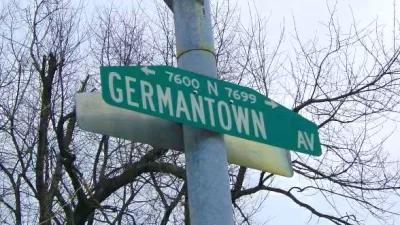A Philadelphia councilmember has proposed a seemingly esoteric bill that would amend the city code to give individual councilmembers new power in the planning process.

Jon Geeting reports: "A new bill from 10th District Councilman Brian O’Neill could write councilmanic prerogative into the city’s routine planning procedures…by shifting power over property subdivisions that the city charter specifically reserves for the Planning Commission to the discretion of District Councilmembers."
As Geeting explains, "councilmanic prerogative" affords Philadelphia councilmembers "total authority over land use and development matters within their own districts." The Pew Research Center and PlanPhilly have even studied the effect of councilmanic prerogative, finding significant powers to decide issues of city-owned property, zoning, zoning variances, and even street design.
The O'Neill bill would create even more political space for councilmanic prerogative to operate in Philadelphia, especially as a response to the city's 2012 zoning reform process (which would, in theory, allow more development by-right and fewer opportunities for council involvement. The proposed bill would amend the section of the city code governing subdivisions and plats, "[marking] the first time councilmanic prerogative would be written into the city’s standard planning procedures."
FULL STORY: O'Neill bill would codify councilmanic prerogative in subdivision process

Planetizen Federal Action Tracker
A weekly monitor of how Trump’s orders and actions are impacting planners and planning in America.

Maui's Vacation Rental Debate Turns Ugly
Verbal attacks, misinformation campaigns and fistfights plague a high-stakes debate to convert thousands of vacation rentals into long-term housing.

Restaurant Patios Were a Pandemic Win — Why Were They so Hard to Keep?
Social distancing requirements and changes in travel patterns prompted cities to pilot new uses for street and sidewalk space. Then it got complicated.

In California Battle of Housing vs. Environment, Housing Just Won
A new state law significantly limits the power of CEQA, an environmental review law that served as a powerful tool for blocking new development.

Boulder Eliminates Parking Minimums Citywide
Officials estimate the cost of building a single underground parking space at up to $100,000.

Orange County, Florida Adopts Largest US “Sprawl Repair” Code
The ‘Orange Code’ seeks to rectify decades of sprawl-inducing, car-oriented development.
Urban Design for Planners 1: Software Tools
This six-course series explores essential urban design concepts using open source software and equips planners with the tools they need to participate fully in the urban design process.
Planning for Universal Design
Learn the tools for implementing Universal Design in planning regulations.
Heyer Gruel & Associates PA
JM Goldson LLC
Custer County Colorado
City of Camden Redevelopment Agency
City of Astoria
Transportation Research & Education Center (TREC) at Portland State University
Jefferson Parish Government
Camden Redevelopment Agency
City of Claremont





























